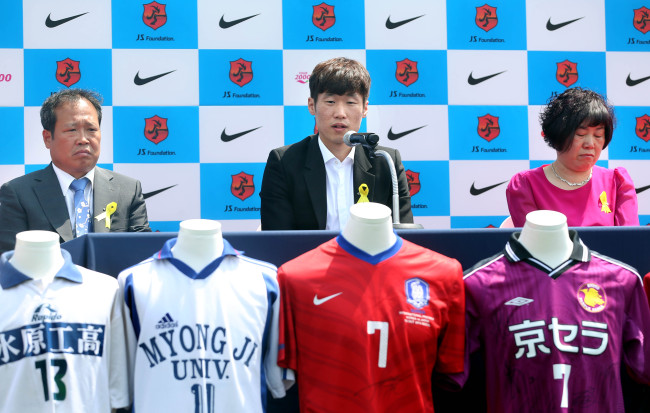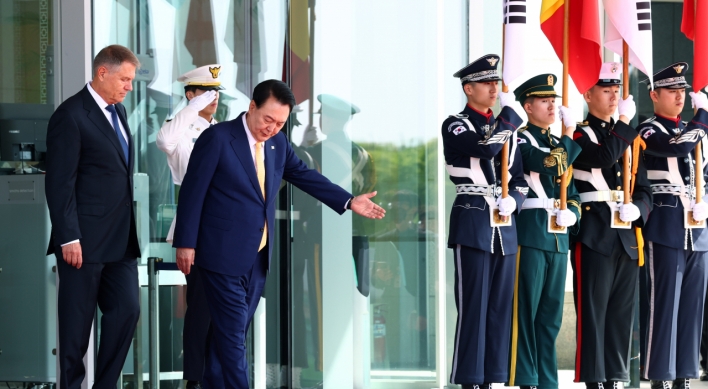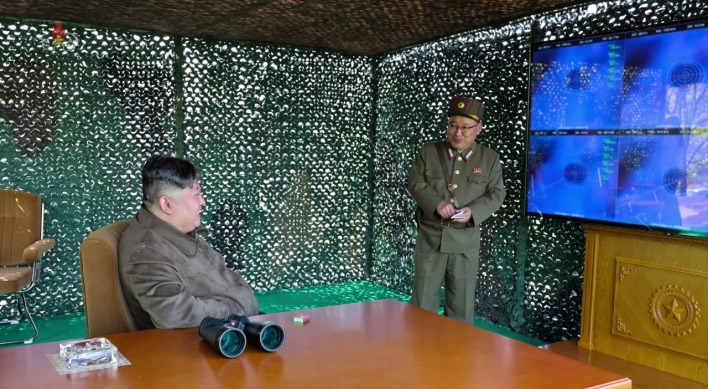End of the line: Korean soccer icon Park Ji-sung calls it quits
By Korea HeraldPublished : May 14, 2014 - 20:21
SUWON, Gyeonggi Province (Yonhap) ― Park Ji-sung, one of South Korea’s biggest soccer icons, retired from the sport on Wednesday at age 33, citing debilitating pain in his surgically repaired right knee.
Park, former national team captain and the first South Korean to play in the English Premier League, was the picture of composure, flashing an occasional smile as he wrapped up an illustrious career that included joining South Korea’s historic run to the semifinals at the 2002 FIFA World Cup.
“I’ve been mulling retirement since February, and I’ve concluded that my knee won’t hold up for another season,” Park said at JS Football Center, named after his initials in Suwon, about 45 kilometers south of Seoul. He grew up in the city, where he also has a street named after him.
“I have no regrets about my career,” Park continued, with shirts from every team he’d played for, from elementary school to the Dutch side PSV Eindhoven this year, lined up in front of his stage. “I do think about what might have been if I hadn’t been injured, but I have no feelings of disappointment or sorrow as I leave the sport. I have been very fortunate.”
Park, former national team captain and the first South Korean to play in the English Premier League, was the picture of composure, flashing an occasional smile as he wrapped up an illustrious career that included joining South Korea’s historic run to the semifinals at the 2002 FIFA World Cup.
“I’ve been mulling retirement since February, and I’ve concluded that my knee won’t hold up for another season,” Park said at JS Football Center, named after his initials in Suwon, about 45 kilometers south of Seoul. He grew up in the city, where he also has a street named after him.
“I have no regrets about my career,” Park continued, with shirts from every team he’d played for, from elementary school to the Dutch side PSV Eindhoven this year, lined up in front of his stage. “I do think about what might have been if I hadn’t been injured, but I have no feelings of disappointment or sorrow as I leave the sport. I have been very fortunate.”

Park played his last official match on May 3 with PSV and ended his second tour of duty with the Dutch club with a 2-0 win over NAC Breda. Under contract with Queens Park Rangers in England, the midfielder was loaned to PSV for the past season, in which the club finished fourth among 18 teams in the Eredivisie, the top-flight competition in the Netherlands.
Park had an operation to remove damaged cartilage in his right knee in March 2003, and four years later, underwent an articular cartilage restoration procedure. He was kept off the field for eight months after the second surgery and had occasional flare-ups on the same leg over the ensuing years.
“I could have opted for another surgery to get ready for next season,” Park said. “But it would have taken too much time, and there was no guarantee that the knee would get better. And retirement was the only option I had left.”
Park was accompanied to the press conference by his parents, who appeared to be more emotional than the former South Korean captain. Park said he was able to stay composed because he accomplished more in his career than he ever imagined.
Park, who runs his own charity foundation, said that in his post-playing career, he will try to find ways to return the love and support he received from his fans, though not necessarily through coaching.
“I have said many times that I have no desire to become a coach, and I don’t even have a coaching certificate,” Park said with a smile. “I am thinking of becoming a football administrator, but it’s not a clear objective yet. I am going to think about what I can do to help Korean football and Korean sports. It will take a long time.”
Park, a versatile player known for his tireless work ethic, leaves the sport with his legacy in international and club play well secured.
He represented South Korea at three straight FIFA World Cups starting in 2002, and scored a goal in all three.
Park netted the winner in cohost South Korea’s 1-0 victory over Portugal in the final group match in 2002, putting the country in the knockout stage for the first time ever.
Four years later, Park scored the equalizer to hold the eventual runner-up France to a 1-1 draw, but South Korea couldn’t get past the group phase in Germany.
In 2010 in South Africa, Park was the South Korean captain, and scored the second goal in a 2-0 win over Greece, as South Korea reached the round of 16 for the first time away from home.
All in all, Park played 100 international matches, one of eight South Koreans with at least 100 caps.
The undersized player, overlooked by South Korean scouts out of high school, entered a small college before making his professional debut with Japan’s Kyoto Purple Sanga in 2000. Following a successful campaign at the 2002 World Cup, Park joined PSV Eindhoven, coached by Guus Hiddink, who’d managed South Korea at the World Cup.
Three years later, Park became the first South Korean to reach the English Premier League when he signed with Manchester United. He went on to enjoy the best seven-year span of his pro career, winning four Premiership titles and one UEFA Champions League crown.
Park joined another Premier League club, QPR, before the 2012-13 season. He began the season as QPR’s new captain, but the club was relegated to the second-tier Football League Championship for the following season.
Park returned to PSV before the 2013-14 season and made 23 Eredivisie appearances.
Park has long been known for his ability to play anywhere in midfield and also his high work rate, which earned him the moniker “Three-Lung Park” while with Manchester United. Park’s hard-nosed, all-out style of play, though, might also have been his undoing, given his history of knee problems.
Asked to rate his own career, Park gave himself a seven out of 10.
“I wasn’t perfect, and no one is,” he said. “Players all have different strengths, and how you can maximize them to help the team win determines your value. The key for me was to capitalize on my energy because it wasn’t something that everyone had. I don’t regret that I was never a great technician, because I enjoyed football with what other players didn’t have.”
-
Articles by Korea Herald


![[AtoZ into Korean mind] Humor in Korea: Navigating the line between what's funny and not](http://res.heraldm.com/phpwas/restmb_idxmake.php?idx=644&simg=/content/image/2024/04/22/20240422050642_0.jpg&u=)



![[Herald Interview] Why Toss invited hackers to penetrate its system](http://res.heraldm.com/phpwas/restmb_idxmake.php?idx=644&simg=/content/image/2024/04/22/20240422050569_0.jpg&u=20240422150649)

![[Graphic News] 77% of young Koreans still financially dependent](http://res.heraldm.com/phpwas/restmb_idxmake.php?idx=644&simg=/content/image/2024/04/22/20240422050762_0.gif&u=)






![[Exclusive] Korean military set to ban iPhones over 'security' concerns](http://res.heraldm.com/phpwas/restmb_idxmake.php?idx=652&simg=/content/image/2024/04/23/20240423050599_0.jpg&u=)



